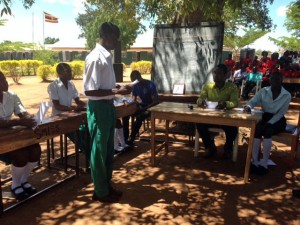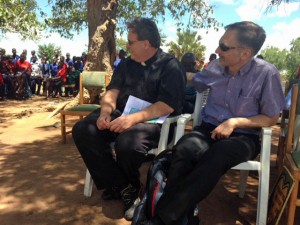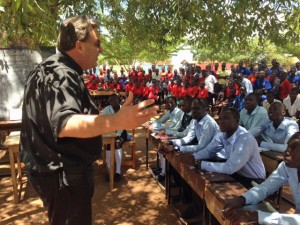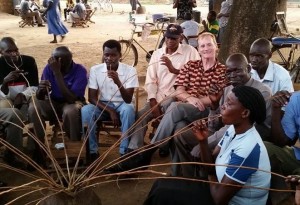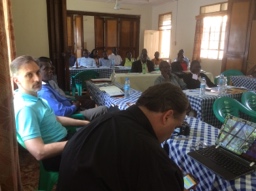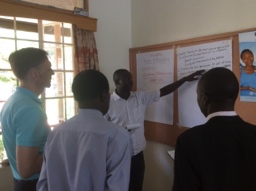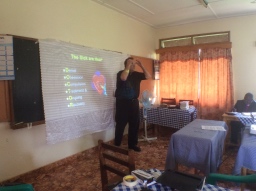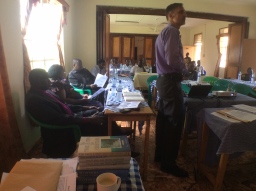Tuesday, April 21
Whenever I come to Uganda, I find I can be useful just by making appearances in the right rooms with the right people. That means meetings. Some of these are not going to be directly relevant to what Jay and Mark have signed up for, but they are glad to come along for the ride. And I am glad to have their company. Pilgrim staff work hard, and almost all of their work involves partnerships: with USAID, the Ugandan government, the churches. I am sometimes useful in being able to say to some of our partners what even senior Pilgrim staff cannot say; coming in from the outside as President of an international board means I am given up front a certain allowance of social forgiveness.

The Pretty Side of Kampala
This comes in handy with our first meeting at the Ministry of Health. Dr. Meyers Lugemwa is the senior deputy for malaria control; Solomon has two questions he needs to get answered, which I need to ask. First, we have had a MoU (memorandum of understanding) in process for several months waiting to be signed by somebody in the Ministry of Health. Dr. Lugemwa is cordial, apologetic, notes that it must be stuck in the legal office and commits to get the thing finished. Second, the Ministry of Health is sitting on serious quantities of the chemical used in our spraying protocol, all of which will expire in November. We really need him to commit that to Katakwi; he is more shy about this ask. Apparently the stuff has already been committed to two other localities. (Elections are coming up in 2016 and this is a way for the MP’s to show they are doing something about public health in their districts.) The problem is that, if these chemicals are used without any other co-ordinated efforts (e.g. mass drug distributions, use of treated bednets, etc.) the end result will be exactly no medium- or long-term benefit to the people. We end with the good doctor committing to a conversation with “affected parties;” he is a good man not in an easy position, and I resolve to pray for him.
Our second meeting is with the USAID mission director at the US embassy. This is a courtesy call, and so will be brief, about half an hour. (It actually takes us longer to clear security). USAID directs PMI (the President’s Malaria Initiative), and they have trained, and continue to train, our field staff in IRS (Indoor Residual Spraying) and in other aspects of malaria control.
First, I just want to say Thank you, to the mission director Leslie Reed and the senior staff; which they appreciate. Solomon then gives an overview of Pilgrim’s process and goals in the Katakwi project, an intervention across three sub-counties that should come close to eliminating malaria for nearly 38,000 people. Leslie is a seasoned professional diplomat, gets it all instantly, asks a few pointed questions, which Solomon addresses comprehensively; we have some further conversation with her medical chief, Dr. Kassan, shake hands warmly all around, then leave. The tone and content of the meeting are all good news. Pilgrim has a grant proposal for $500k pending before the Global Fund for this project and it is a good thing to be getting good grades in the eyes of USAID.
In the afternoon, the team splits up. I meet with half a dozen national leaders of two Pentecost associations and a co-ordinator for the Church Malaria Program, an interdenominational effort to mobilize the churches in grass-roots support for the kind of thing we are trying to do in Katakwi. Mark and Jay go elsewhere. Here is Mark’s description:
We were advised that the mental health inpatient facility in Kabala, called Butabika, had a drug and alcohol detox unit! One of the areas of focus for our week here has been to identify, develop, and connect resources in Uganda for the treatment of alcoholism. In any setting, alcoholism is a complex problem, stemming from a number of economic, social, spiritual, medical and culture forces that have conspired to create a significant problem. In Uganda, there are very limited solutions for those entangled within it. So….if there was a hospital here that was working with treatment and detox, it would make great sense to visit and see what they were up to.
Dr. Ben Khingi, a Ugandan board member with Pilgrim, has an inspiring vision and commitment to his people. He advised us to just “show up”, confident that we would be able to make connections. He was spot on. We were warmly welcomed and had a great visit with the clinicians and staff there. The facility was impressive in general, it was expansive; located on a hill with a sweeping vista of Lake Victoria, it was neatly kept and staffed by warm, compassionate people. Although the medical director had gone for the day, we were able to have a great conversation with one of the drug and alcohol counselors, briefly meet some of the patients, and talk to several of the managers of the unit.In a very moving expression of God’s grace, several of the patient’s approached Fr. Jay as we left the hospital, asking him to pray for them.
“As with most complex problems, easy solutions over-simplify. Pray for the coming of Christ’s kingdom as Pilgrim and others seek to bring together the pieces need to address the issue of Alcohol and Drug addiction in this place.”
By the time we get back together, it is nearly 7 p.m. I feel like a wet rag, but I am energized by Jay and Mark’s reports of their excursion. I am not sure where the partnership meeting with the Pentecostals will go, even though we did wind up with one or two concrete action items, but I am learning that God will use just about any small effort to bring forth great fruit. May it be so, in this matter, with these dear brothers and sisters.

